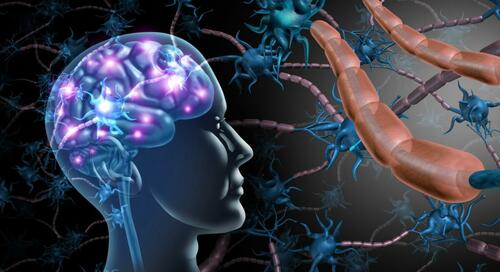
Authored by Amy Denny via The Epoch Times (emphasis ours),
Researchers have identified a microbial signature for autism spectrum disorder, a critical finding that offers clarity about how the gut microbiome influences this neurological syndrome.
The data-driven study published by 43 researchers challenges the idea that autism is a primarily genetic condition and suggests that environmental factors may be behind the sharp rise in the debilitating condition.
The trillions of microbes (bacteria, viruses, fungi, and other microorganisms) that populate the gut microbiome are the basis of that microbial signature. Other research has found that having more microbes and greater diversity is associated with health and lower disease risk. Among other tasks, gut bacteria metabolize fiber and create metabolites that facilitate digestion, brain functions, and more.
The study involved reanalyzing 25 previously published datasets to find autism-specific metabolic pathways that could be linked to particular gut microbes. Originated at the Simons Foundation’s Autism Research Initiative (SFARI), the meta-analysis was published on June 26 in Nature Neuroscience and aligns with a recent long-term study of microbiome-focused treatment on 18 people with autism who exhibited improvement in both gut and brain symptoms.
“It provides further evidence that the microbiome is altered in autism and that it relates to alterations in biochemistry and that those alterations can affect GI [gastrointestinal] and neurological functioning,” James Adams, professor at Arizona State University’s Biodesign Center for Health Through Microbiomes, told The Epoch Times. He’s been studying the gut–autism link for 20 years and is co-author of the study of 18 people highlighted in the new research.
The Growing Shadow of Autism
No single cause has been found for autism spectrum disorder, which is a heterogeneous condition displaying genetic, physiological, and behavioral patterns. It’s usually diagnosed in childhood and now affects 1 in 36 children, up from 1 in 44 just two years ago.
The obstacles to studying autism include difficulty testing children who have severe cases and difficulty observing signs and symptoms in subjects. The fact that it’s a neurological condition makes it more difficult to study.
Combined with the vastness of the microbiome, that has made it difficult and controversial to quantify the role gastrointestinal problems play in autism. One goal of the study was to forge consensus on this relationship, Jamie Morton, one of the study’s corresponding authors and an independent consultant, told The Epoch Times.
Mr. Morton said researchers were surprised at the connections observed when they applied an algorithm to the data. They put autistic and neurotypical controls side by side to look for such traits as gene expression, immune system response, and diet.
“What was startling was how strong the signal was. After running our analysis, you could just see it pop off from the raw data,” Mr. Morton said. “We hadn’t seen this kind of clear overlap between gut microbial and human metabolic pathways in autism before.”
A “pathway” is a biochemical process of linked reactions whereby one molecule is processed into another, or compounds are changed in a series of processes to deliver a certain substance to a certain place in the body. For example, you may eat a certain vitamin or compound that gets digested into other molecules that get changed into other molecules through cellular processes until they eventually reach your brain as a specific neurotransmitter.
Researchers said the new information paves the way for precise treatment-focused research on manipulation of the microbiome. The ability to use stool analysis to see how patients respond to specific interventions over time can shape future studies and, ultimately, clinical care.
“What’s significant about this work is not only the identification of major signatures, but also the computational analysis that identified the need for future studies to include longitudinal, carefully designed measurements and controls to enable robust interpretation,” Kelsey Martin, executive vice president of SFARI and the Simons Foundation Neuroscience Collaborations, said in a SFARI statement.
Study Specifics
The meta-analysis compared 600 pairs of children; each pair consisted of a child with autism and a neurotypical control of the same age and sex. Each pair was analyzed and compared using novel computational methodologies so the researchers could identify microbes with differing abundances between the two groups.
There were 95 metabolic pathways differentially expressed in the brains of autistic subjects that had corresponding microbial pathways. “Pathways related to amino acid metabolism, carbohydrate metabolism and lipid metabolism were disproportionately represented among the overlapping pathways,” the study reads.
Functionally, those pathways were confirmed with microbial species in the genera of Prevotella, Bifidobacterium, Desulfovibrio, and Bacteroides. And they are associated with brain gene expression changes, restrictive dietary patterns, and pro-inflammatory cytokine profiles.
The study’s inclusion of the 2019 long-term fecal microbiota transplant study led by Mr. Adams and Rosa Krajmalnik-Brown makes the evidence more robust.
“Another set of eyes looked at this, from a different lens, and they validated our findings,” Ms. Krajmalnik-Brown said of the meta-analysis in the statement.
The Adams and Krajmalnik-Brown study was also published in Nature and noted lower overall microbial diversity and reduced Prevotella copri and Bifidobacterium in children with autism.
The original study treated 18 children with a microbial transfer therapy that included two weeks of treatment with the powerful antibiotic vancomycin, a bowel cleanse, one initial high dose and 10 weeks of daily low doses of microbial transfers along with a low-dose stomach-acid suppressant.
Essentially, subjects had their gut microbiome cleared out and received a new one from a transplant of healthy donor stool. The results included an 80-percent reduction in GI symptoms and a slow, steady improvement in autism symptoms. The two-year follow-up of the same cohort showed that children in the severe range of autism had significantly decreased symptoms and that beneficial bacteria remained high.
Validation
The meta-analysis provides large-scale confirmation of a theory that many clinicians and researchers have had for years based on studies and observational evidence.
“They’re adding credibility to gut treatment with autistic kids. We’ve been treating autistic kids for decades on the gut, and we’ve had a lot of mainstream criticism for it,” Dr. Armen Nikogosian, a medical and functional doctor who specializes in autism care, told The Epoch Times. “That being said, we certainly haven’t figured it all out, but we knew there was a clear connection between the gut and the brain of the autistic child.
Authored by Amy Denny via The Epoch Times (emphasis ours),
Researchers have identified a microbial signature for autism spectrum disorder, a critical finding that offers clarity about how the gut microbiome influences this neurological syndrome.
The data-driven study published by 43 researchers challenges the idea that autism is a primarily genetic condition and suggests that environmental factors may be behind the sharp rise in the debilitating condition.
The trillions of microbes (bacteria, viruses, fungi, and other microorganisms) that populate the gut microbiome are the basis of that microbial signature. Other research has found that having more microbes and greater diversity is associated with health and lower disease risk. Among other tasks, gut bacteria metabolize fiber and create metabolites that facilitate digestion, brain functions, and more.
The study involved reanalyzing 25 previously published datasets to find autism-specific metabolic pathways that could be linked to particular gut microbes. Originated at the Simons Foundation’s Autism Research Initiative (SFARI), the meta-analysis was published on June 26 in Nature Neuroscience and aligns with a recent long-term study of microbiome-focused treatment on 18 people with autism who exhibited improvement in both gut and brain symptoms.
“It provides further evidence that the microbiome is altered in autism and that it relates to alterations in biochemistry and that those alterations can affect GI [gastrointestinal] and neurological functioning,” James Adams, professor at Arizona State University’s Biodesign Center for Health Through Microbiomes, told The Epoch Times. He’s been studying the gut–autism link for 20 years and is co-author of the study of 18 people highlighted in the new research.
The Growing Shadow of Autism
No single cause has been found for autism spectrum disorder, which is a heterogeneous condition displaying genetic, physiological, and behavioral patterns. It’s usually diagnosed in childhood and now affects 1 in 36 children, up from 1 in 44 just two years ago.
The obstacles to studying autism include difficulty testing children who have severe cases and difficulty observing signs and symptoms in subjects. The fact that it’s a neurological condition makes it more difficult to study.
Combined with the vastness of the microbiome, that has made it difficult and controversial to quantify the role gastrointestinal problems play in autism. One goal of the study was to forge consensus on this relationship, Jamie Morton, one of the study’s corresponding authors and an independent consultant, told The Epoch Times.
Mr. Morton said researchers were surprised at the connections observed when they applied an algorithm to the data. They put autistic and neurotypical controls side by side to look for such traits as gene expression, immune system response, and diet.
“What was startling was how strong the signal was. After running our analysis, you could just see it pop off from the raw data,” Mr. Morton said. “We hadn’t seen this kind of clear overlap between gut microbial and human metabolic pathways in autism before.”
A “pathway” is a biochemical process of linked reactions whereby one molecule is processed into another, or compounds are changed in a series of processes to deliver a certain substance to a certain place in the body. For example, you may eat a certain vitamin or compound that gets digested into other molecules that get changed into other molecules through cellular processes until they eventually reach your brain as a specific neurotransmitter.
Researchers said the new information paves the way for precise treatment-focused research on manipulation of the microbiome. The ability to use stool analysis to see how patients respond to specific interventions over time can shape future studies and, ultimately, clinical care.
“What’s significant about this work is not only the identification of major signatures, but also the computational analysis that identified the need for future studies to include longitudinal, carefully designed measurements and controls to enable robust interpretation,” Kelsey Martin, executive vice president of SFARI and the Simons Foundation Neuroscience Collaborations, said in a SFARI statement.
Study Specifics
The meta-analysis compared 600 pairs of children; each pair consisted of a child with autism and a neurotypical control of the same age and sex. Each pair was analyzed and compared using novel computational methodologies so the researchers could identify microbes with differing abundances between the two groups.
There were 95 metabolic pathways differentially expressed in the brains of autistic subjects that had corresponding microbial pathways. “Pathways related to amino acid metabolism, carbohydrate metabolism and lipid metabolism were disproportionately represented among the overlapping pathways,” the study reads.
Functionally, those pathways were confirmed with microbial species in the genera of Prevotella, Bifidobacterium, Desulfovibrio, and Bacteroides. And they are associated with brain gene expression changes, restrictive dietary patterns, and pro-inflammatory cytokine profiles.
The study’s inclusion of the 2019 long-term fecal microbiota transplant study led by Mr. Adams and Rosa Krajmalnik-Brown makes the evidence more robust.
“Another set of eyes looked at this, from a different lens, and they validated our findings,” Ms. Krajmalnik-Brown said of the meta-analysis in the statement.
The Adams and Krajmalnik-Brown study was also published in Nature and noted lower overall microbial diversity and reduced Prevotella copri and Bifidobacterium in children with autism.
The original study treated 18 children with a microbial transfer therapy that included two weeks of treatment with the powerful antibiotic vancomycin, a bowel cleanse, one initial high dose and 10 weeks of daily low doses of microbial transfers along with a low-dose stomach-acid suppressant.
Essentially, subjects had their gut microbiome cleared out and received a new one from a transplant of healthy donor stool. The results included an 80-percent reduction in GI symptoms and a slow, steady improvement in autism symptoms. The two-year follow-up of the same cohort showed that children in the severe range of autism had significantly decreased symptoms and that beneficial bacteria remained high.
Validation
The meta-analysis provides large-scale confirmation of a theory that many clinicians and researchers have had for years based on studies and observational evidence.
“They’re adding credibility to gut treatment with autistic kids. We’ve been treating autistic kids for decades on the gut, and we’ve had a lot of mainstream criticism for it,” Dr. Armen Nikogosian, a medical and functional doctor who specializes in autism care, told The Epoch Times. “That being said, we certainly haven’t figured it all out, but we knew there was a clear connection between the gut and the brain of the autistic child.
Loading…




